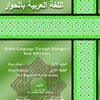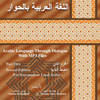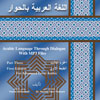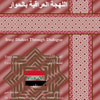Welcome!
Salam Dear Visitor,
This is the first edition of the “Arabic Language Through Dialogue” 1, 2 and 3 series in addition to the Iraqi Dialect through Dialogue book. The series attempts to make learning of the Arabic language more accessible and enjoyable to non-native speakers of Arabic using dialogues and communicative exercises that relate to the dialogue in each lesson. The series was made possible by partial funding and complete encouragement from the Language Acquisition Resource Center (LARC) under the directorship of Dr. Mary Ann Lyman-Hager and hosted at the San Diego State University. Dr. Ghada Osman, the director of the Center of Arabic and Islamic Studies at the San Diego State University, offered us invaluable advice and encouragement. In these books you will see the following:
- High frequency dialect (A’miyyah) utterances are incorporated in each dialogue to give the learner a flavor of a’miyyah across the Arab world.
- Arabic music and songs are used to teach the various dialects of the Arab world and to infuse the books with Arab culture.
- The dialogues deal with everyday life issues from ordering food to renting a house to buying a car to talking about School and politics and social issues. All of this is done in a very easy MSA language that approximates the spoken language of educated Arabs.
- Idiomatic expressions are incorporated in the dialogues.
- Famous Arabic proverbs are part of every lesson in Book 3 and they come from a different región in the Arab world. We did not want to focus on one dialect as we wanted to expose learners to the 4 major Arabic dialects through songs, idiomatic expressions and high frequency words and then leave it up to the learner to decide which one he/she is most interested in. Once they decide which dialect they want to pursue, they can then plan their summer or semester abroad based on that knowledge.
- Many games and fun activities are incorporated in each lesson.
- Grammar is an important piece of these books but it is not the centerpiece. Learners will be exposed to all the grammatical notions and concepts needed to build their linguistic knowledge but the our focus remains on the USING the language rather than knowing ABOUT the language.
- All the dialogues are available here on this page to listen to.
- Tahiyyati and I hope that you enjoy learning Arabic using this series,
If you want to know more information about Arabic Language Programs, please click Here
- To purchase these Textbooks, please contact Montezuma Publishing.



